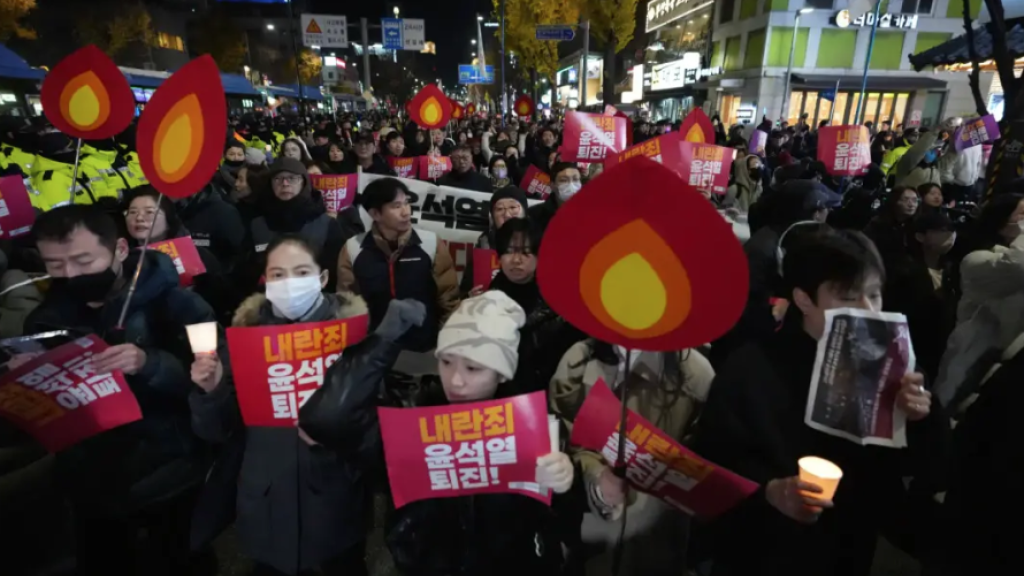South Korea: After President Yoon’s failed self-coup

President Yoon Suk Yeol’s self-coup failed within 153 minutes. Though the situation remains volatile, people are safe from the threat of military confrontation or repression.
What happened?
At 10.29pm on December 3, Yoon declared he was imposing martial law, formed a military command and sent armed special force troops to occupy parliament and arrest key politicians.
But the coup attempt failed.
As parliamentary officials and opposition party staff fought back against the coup-plotting soldiers inside parliament, activists and trade unionists gathered outside.
By 1.02am on December 4, 190 MPs — including the entire opposition and some government MPs — managed to convene an emergency plenary session and unanimously vote to repeal martial law.
A few hours later, Yoon accepted defeat and said he would respect parliament’s decision. But the question of whether Yoon should resign or be impeached remains unresolved.
Still a mystery
Why did Yoon attempt a self-coup? The president said his intention was to remove a “cancer”, namely supposedly pro-North Korean anti-government forces. But this is a farcical excuse.
What we know is that most of the key military and civilian figures involved in the coup attempt were Yoon’s colleagues in high school. Moreover, the number of soldiers involved was very small, less than 280.
The poorly written martial law decree revealed how little thought out the conspirators’ plan was.
Yoon’s secretaries and ministers quickly resigned, as did his defense minister who, having participated in the coup plot, tried to claim responsibility for defeating it.
We also know that Yoon and his wife, Kim Keon-hee, have previously exhibited bizarre behaviour. In many ways, their marriage resembles a black comedy and gossip TV series.
For most of her life, Kim has been a surreal figure, having been involved in several financial scams, many orchestrated by her mother, herself a large-scale behind the scenes scammer.
Perhaps responsibility for the coup plot lies completely with the couple. The reality is that few Koreans understand either of them.
What is more, Yoon is a very poor communicator. In early November, the president delivered a speech to the nation in which he was supposed to apologise for his wife’s involvement in several scandals. His speech was so vague that nobody understood what he was apologising for.
It will take more time to figure out the real motives behind the coup. No doubt more information will come out during the trial and punishment of the coup plotters.
Division within the ruling party
With the president seemingly refusing to step down, opposition parties are seeking to impeach him.
Back in 2016-17, South Koreans forced parliament to impeach then-president Park Geun-hye after 134 days of consecutive candlelight protests that together mobilised more than 15 million people. Park belonged to a predecessor party that later helped form Yoon’s People Power Party (PPP) in 2020.
The ruling right-wing PPP faces a deep crisis. It suffered a huge defeat in the April general elections, which left it a minority bloc in parliament.
Despite Yoon hand-picking his close friend Han Dong-hoon to lead the party, the PPP is today divided between Yoon and Han supporters.
Yoon’s coup attempt took party leaders by shock, leading Han and 18 other government MPs to join with the opposition in repealing martial law.
At first, it also appeared they would support impeachment. But after much debate, Han’s faction failed to persuade Yoon’s backers to support impeaching the president.
While there was no way the pro-Yoon faction could justify the coup, impeachment was a step too far. Many felt impeaching a second president would spell political death for the party.
The ruling party’s decision placed the opposition Democratic Party in a delicate situation as they required the votes of at least some government MPs to obtain the two-thirds majority required for impeachment.
But with public opinion turning on the failed coup leader, the PPP may soon pay a very heavy political price for its continuing support of Yoon.
A December 4 survey of 504 respondents found 73.6% supported impeachment, with only 24% opposed.
Asked whether Yoon had committed the crime of treason by declaring martial law, 68.5% answered yes; only 24.9% said no.
The real battle is in the streets
Given impeachment seems to be blocked, it is now up to the people to step in where politicians failed.
Given the self-coup ended quite swiftly, popular mobilisation against it was fairly limited. Protests were held inside and outside parliament, as well as in Gwanghwamun Square, a symbolic protest site during the 2018 candlelight protests.
A huge protest to demand Yoon’s resignation is planned for Seoul this weekend.
The PPP will no doubt become a target of people’s ire should it choose to continue supporting Yoon. The ruling right-wing conservatives face an existential choice of discarding Yoon or going down in flames with him as a political force.
Whatever his intention, Yoon failed to recognise the deep-seated nature of people’s decades-long popular resistance to military and civilian dictatorships. South Koreans refuse to accept the sight of tanks and troops occupying the heart of Seoul.
Yoon’s failed coup has shown that South Korea still has some way to go to achieve genuine democracy — and that obtaining this will require further democratic revolutions.
Won Youngsu is an activist, Marxist and labour studies researcher. He is the Director of Pnyx – Institute of Marxist Studies in Korea.